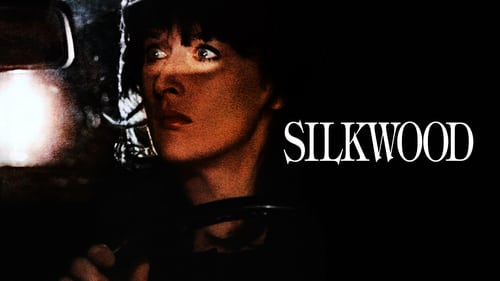CommentsXp
Best movie ever!
Limerculer
A waste of 90 minutes of my life
Stoutor
It's not great by any means, but it's a pretty good movie that didn't leave me filled with regret for investing time in it.
Kien Navarro
Exactly the movie you think it is, but not the movie you want it to be.
edwagreen
Meryl Streep, the master of dialects and drawls, is at it again in this biography of metallurgy worker Karen Silkwood, who may have very well been done away with to prevent her from bringing out the truth of exposure of workers in a certain Texas plutonium plant's exposure to the deadly chemical.Streep starts off as a good-time southern girl with several illegitimate children from one man who she has left and taken up with Kurt Russell. Cher, is a long for the ride, as the woman she lives with, a lesbian whose makeup in the film seems to reveal much exposure to the chemical. Kudos to the make-up artist for Cher in the film.Silkwood becomes another Norma Rae, fighting for the dignity of workers and keeping the union going within the factory.This tragic story reveals the nature of the dangers of exposure to chemical compounds and what industry will do to keep the workers quiet.
ElMaruecan82
Karen Silkwood, casually chewing gum, finishes her working day by a routine cleaning task. She then leaves the room, raises her hand toward the radiation detector, as she always does, but this time, the strident alarm suddenly starts ringing, indicating that she may have been exposed to radiations. Karen tries not to panic although she's visibly shocked. And the scene cuts to the first of her three "cooking" treatments, which in nuclear jargon, means getting into a hot, long and painful decontaminating shower. That very moment is Karen Silkwood's story in microcosm, perfectly reflecting who she was and what she went through. Basically, Karen can't see the danger pending above her frail shoulders. She's not a fool but in a tragically admirable way, she is just blinded by her own integrity. Later in the film, she just enters the door, and the sound startles us again, we have a quick glimpse on the "Danger Radiation" signal, then it cuts to her cries of fear and disbelief under the hot shower, again. The sad irony is that Karen tried to apply some cleansing on the field of ethics, in the Nuclear factory she worked in, but the more she tried, the more tortured she was by the 'invisible enemy'. And the frequency of the shower scenes plays like the omen of a series of misfortunes leading up to a tragic conclusion, the ultimate 'cleaning'. Indeed, we all know that Karen Silkwood died in a mysterious car accident, so the shower scenes, each time more intense and haunting, marks the beginning of the end for Karen Silkwood. But as aware as we are about the facts, there's something in Karen's portrayal by Meryl Streep and in Mike Nichols' sober directing that don't get us prepared to it. Karen is no more idealistic than any other, she lives her life, she jokes and smokes, a lot as a matter of fact, she enjoys flirting, teasing her friends, she's like any small-town girl of her generation. "Silkwood" borrows many elements from 70's dramas like "Serpico", "Norma Rae" or "The China Syndrome", movies featuring ordinary persons, so dedicated to their job they couldn't close their eyes on some unethical practices and made outcasts of themselves by blowing the whistle.Karen belongs to America's struggling, unorganized working class. Her three children live with her ex-husband, and she shares a ramshackle house with her boyfriend Drew and lesbian friend Dolly, superbly played by Kurt Russell and Cher. As to emphasize the fact that the factory nourishes the town, they also happen to be co-workers. Indeed, whether a cotton mill or corporate police, the factory producing plutonium fuel rods for nuclear reactors, is only the setting and the film deals with a sincere austerity a slice of American workers' ordinary lives in a crisis-stricken America, with a more dramatic turn since it's a life-and-death situation, governed by pure profits' motives. When the plant falls into an important contract and workers are forced to work over hours and falsify some records, the effect on their health is perceived as minor collateral damage, a chance even workers are ready to take, because at least, their wages is a valuable certitude. "Silkwood" chronicles Karen's double evolution: her ascension from a worker to a union activist, traveling to Washington, interacting with union officials, testifying before the Energy Atomic Commission and revealing that some records are altered. And in the same time, there's a descent into the outcast status, making her more and more undesirable, but in the meantime, more and more determined to conduct the investigation on her own. Karen died the night she was supposed to give documentation to New York Times reporter but none of it was found in her crushed car, except convenient hints indicating that she was drugged and 'fall in sleep" while driving. From all the previous heroes I mentioned, Silkwood is the most tragic character because she paid the highest price. And what makes the story so heart-breaking is that it's not until it's too late, that she realizes she's been sailing on trouble waters. I'm still haunted by the last shot of Karen blinded by headlights on her rear view mirror. Is she worried, surprised? or does she literally see the light, realizing where her fight has lead up and is probably aware of what's awaiting her? We're only left with our sorrow, sadness and disbelief shared by her co-workers and friends when the crushed car is dragged to town. And it's the bold and abrupt realism that emotionally enhances the film, it's set in 1974, but the feeling is so authentic I felt like it was made in 1974.Nichols' doesn't stylize the film, shot like a documentary. The big corporations aren't vilified as Karen isn't romanticized either. The only time the 'David vs. Goliath' aspect of her fight is hinted is when she looks for retouched negatives of faulty fuel rods and is confronted by Craig T. Nelson. She tells him she's looking for her pills, but the intimidating towering presence of Nelson accentuates Karen's vulnerability and provides the first hints of danger.Realistic dramas like "Silkwood" can only rely on performances and Meryl Streep dilutes herself as Karen Silkwood. She wasn't thirty in "Kramer vs. Kramer" but she conveyed a classy maturity, she's older in "Silkwood" but she looks like a 28-year old woman with that mixture of tenderness and carelessness, and so deeply rooted altruism. I didn't know Meryl Streep could look so adorable, so childish, being sometimes naughty, yet revealing a stronger side than anyone, something she didn't knew she had. That's the stuff heroes are made on and I was sad to see that Karen Silkwood was only listed as 47 on AFI's Top 50 Heroes, so far below Norma Rae (#17) and Erin Brokovich (#31), especially since the reason why I loved "Silkwood" is precisely why I didn't like "Erin Brokovich".
MafiaScarecrow
Karen, a low-income science loving woman from Texas, lives with her two co-workers: Dolly (played by Cher), who is a lesbian and Karen's best friend, and Drew, Karen's easy-living boyfriend. All three of them work for the Kerr-McGee corporation, along with several employees: Winston - a pervert and the nervous new guy Hurley - the foreman and Karen's boss/ sort of friend Gilda - Karen's friend in their station Velma - a mother of several kids, including a daughter with cancer Wesley - an obnoxious worker but nice guy When Karen learns of illegal photo tampering, unsanitary workplace conditions, shifty workers and hidden evidence, she goes undercover, and everyone eventually leaves her side, except for Dolly. Eventually Karen's home is contaminated and ripped apart by men in HAZMAT suits, and she gets mad at Hurley when he accuses her of contaminating her own home. After being internally contaminated by plutonium, Karen begins to lose her sanity, and gets killed in a mysterious car crash.It was fairly accurate, the acting wasn't too cheesy, and the movie was funny as well as dramatic. One actor who did really well was the one who played Winston. I'd rate it 10/10, except it seemed that Karen worked so hard, only to be murdered in a ditch. Granted, it is based on true events, but it just seemed a lousy way to end the chance of Karen avenging her co-workers. Overall, it's definitely worth watching. It has some great shots of Texas oil refineries and chemical factories, it's got lots of action, and it makes a significant point.
sashank_kini-1
Silkwood is one of those movies that you simply should not watch at midnight. Unfortunately, my cable television placed the movie at the 12:30 am slot and on top of it kept no intermissions, not even one during the movie. So I had to stay awake late at night and watch this in the living area, dimming the lights around me and lowering the T.V.'s audibility so that my family would not get disturbed by the warning alarm sounds heard often in the film. Without any intermissions, I was a little lost during the movie because keeping an intermission during films does indeed have a powerful impact if placed at the right point – it increases the audience's anticipation and also gives them a break to take in all the details.Silkwood kept chugging on and on in scenes with little dramatic weight (its documentary approach is quite like the lead actress Meryl Streep's other film A Cry in The Dark) or any significant narrative development to hold us in. I quite felt like the movie chose the wrong person to tell its story, and it could've been told better had Karen Silkwood been a supporting character in a film that rather emphasized on the investigation of Kerr-McGee plant and the lawsuit in the aftermath of Silkwood's untimely demise. Unlike Erin Brockovich, Silkwood was not able to directly resolve the issue of health and safety of workers, and though she did play a major role in initiating the whole move, her accident martyrs her for a greater cause. The movie isn't able to deliver her enough justice for her efforts and death, with its epilogue only mentioning that the 'plant closed down a year later' – too grim and defeated to inspire. Karen Silkwood was a courageous small-town gal who took on the Oklahoma nuclear plant where she worked after finding out that it conducted unethical practices without considering workers' safety. From being one of the bubbliest and most beloved persons among her colleagues and supervisors, Karen eventually lost almost everyone's support after helping the union in digging out such malpractices happening at the workplace. Her private life too faced its share of difficulties on top of the mess she was already in even before the incident – apart from losing custody of her three kids, Silkwood's relationship with her boyfriend Drew also suffered when he cautioned her of 'going too far' with the case. She didn't just have to win her colleagues' support but also prove to the union that she was a smart woman with a sharp mind.In one of the film's best acted scenes, Meryl as Karen is discussing recommendations and proposals for the nuclear plant with the senior union members. At first, her suggestions are trivial and her seniors condescendingly put down her ideas and hurriedly begin to leave. It is then that Karen leaves the room and catches them in the corridor where she whispers what she had witnessed at the plant. It is only then that the union takes her seriously. Streep's excellence is evident during close-ups or mid-shots in this movie's case (the film rarely has close- ups), but her screen charisma tends to disappear in her attempt to replicate human-like performances. And this becomes a problem whenever the camera goes away from her, especially here in Silkwood where the cinematography is quite conventional like those old films where the cameras moved less and the actors went back and forth. She's managed to rectify this problem though especially in her recent ventures where her charisma makes for half the performance. Here we manage to catch less than half of whatever she is doing because of the distance the camera maintains.It's not just Streep but also actors Cher, Kurt and director Mike Nichols who act and direct respectively in a similar manner. Now I get it they wanted to depict a dull small-town in Oklahoma with as much truism as possible. Cher (playing Karen's lesbian friend Dolly) wears the most unimposing crumpled and faded jerseys and pants while Russell (playing Karen's boyfriend Drew) is equally untidy and moves around the house shirtless and in cheap blue jeans (though their performances are great). They do everything in their own lazy pace and Cher's Dolly is found half the time either in bed or on the couch. On top of this Nichols makes it even more evident that nothing much happens in 'small town Okie' by placing his camera at a distance. Only a few times do we get shot/reverse shots between the actors and once or twice we see the camera do an effect other than cutting (a few dissolves and an expected fadeout after the crucial scene). Even the upbeat background music at the beginning slowly turns into bleak mournful tunes as the film progresses. It is only the sound of the warning alarm bells that occasionally appear to raise some momentum. There is neither enough follow-up of Silkwood's investigation itself, except for some extended scenes of Karen surreptitiously (hence very slowly) hunting for some 'confidential information'. I could get up in between, bring some chocolates from the fridge in the kitchen and find myself watching her do the same action. The movie 'Silkwood' therefore becomes 'ambitionless' and although I do understand it has deliberately downplayed its 'own cinematic ambition' just to honor the woman's life, the movie as a result also becomes 'one of those inspirational films that come, snag some awards and are soon forgotten'. Or in this film's case, used as a failed 'boob-gag' in Seth MacFarlane's unimpressive Oscar show.








